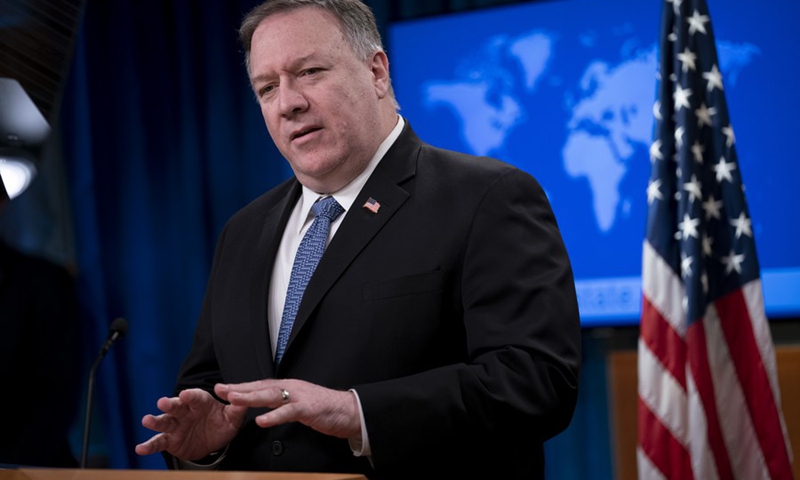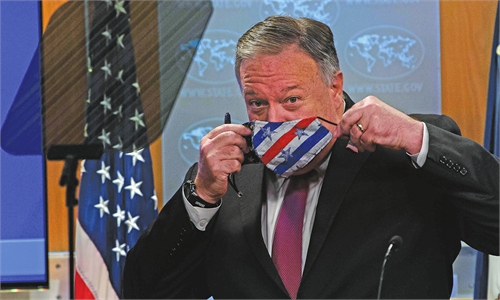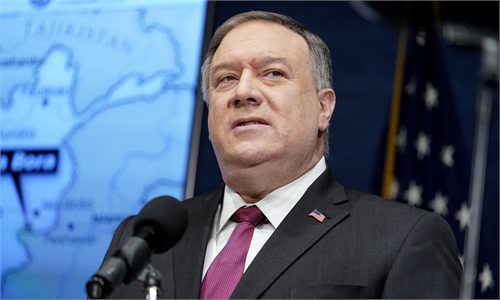GT investigates: Taiwan’s secessionist DPP channels profits to US politicians via covert means like buying over their family, NGOs

US Secretary of State Mike Pompeo speaks during a press briefing in Washington D.C., the United States, on March 5, 2020. (Xinhua/Liu Jie)
The Democratic Progressive Party (DPP) authorities on the island of Taiwan have been channeling large amounts of money to US congressmen who support "Taiwan independence," by either directly funding them or indirectly through the congressmen's affiliated businesses or Taiwan groups stationed in the US, the Global Times has found.
It adopted an approach, in which civil groups extent invitations to US politicians but the DPP authorities eventually pay them using public assets, in order to escape US congressional constraints.
By reviewing related information, the Global Times found that under the pretext that Taiwan is a participant in the US State Department's Mutual Educational and Cultural Exchange Act, the DPP authorities have frequently invited US congressmen, their assistants, and congressional experts to visit the island under the pretense of universities and research institutions, whose "white gloves" have given legitimacy to high-profile receptions, including providing first-class flights, luxury hotels, leisure and entertainment, and paying exorbitant "commission fees." In fact, all activities were arranged and paid for by the DPP authorities.
Former US secretary of state Mike Pompeo has paid his second trip to China's Taiwan this week, trumpeting that the island was "an independent country," as he spoke at a business forum at the invitation of pro-secessionist media Liberty Times.
The Global Times learned that he will allegedly take "commission fees" from companies including Taiwan Semiconductor Manufacturing Co Ltd (TSMC), China Steel Corporation, I-MEI Foods Co Ltd and CHIMEI Corporation.
In his previous visit to the island in March, Pompeo was paid $150,000 for a speech, under the terms of an agreement signed by the Taipei Economic and Cultural Representative Office in the US and US-based company Premiere Speakers Bureau, according to Taiwan media reports.
Analysts pointed out that Pompeo has turned the island of Taiwan into a "cash cow," reaping large amounts of profits while also accumulating political capital for his future plan to run for president. While the DPP authorities, wearing a "white glove" by appearing as a civil society group, have taken benefits from behind to attract more votes in the upcoming local elections in November.
The DPP also paid huge amounts of money to welcome Ed Royce, a "pro-Taiwan independence" Republican congressman, who visited the island in his "farewell trip" before retirement in 2018, according to media reports.
What's more, the DPP has raised the budget for "foreign guest reception" in 2023 to some NT$430 million ($13.6 million) from NT$370 million, an increase of 16 percent.
Apart from directly channeling profits, the DPP has been catering to affiliated or family businesses of US members of Congress, analysts noted.
In April this year, US Senator Lindsey Graham led a congressional delegation to Taiwan including Senator Robert Portman, during which they met with regional leader Tsai Ing-wen and other local politicians. The US senators forcefully asked the DPP to buy 24 Boeing 787 airplanes, with the price mounting to some $8 billion, local media reports said.
It is worth noting that the airliners would be built in South Carolina, where Graham is based, and the engine would be manufactured in Ohio, where Portman is based.
Then on August 30, the China Airlines in Taiwan announced it would buy 16 Boeing 787 planes to replace its ageing fleet of Airbus A330s, Reuters reported. The total cost was some $4.6 billion.
Also in August, while US House Speaker Nancy Pelosi was on her provocative visit to the island of Taiwan, her son Paul Pelosi Jr secretly joined the trip, but his name was not on the official delegation list.
Paul is president of EVSX Corporation. The company is engaged in electric vehicle battery recycling and the development of lithium mineral resources. As Taiwan is rich in lithium resources, it was believed that his trip was aimed at seeking profit for his own business, media reports said.
The transfer of benefits is also made through Taiwan groups in the US. For one thing, they were mobilized to campaign for "pro-Taiwan independence" legislators in the US. For example, when Marco Rubio ran for the Republican presidential candidate in 2016, he received donations from many Taiwan associations in the US, and from companies or banks in the island.
"US-Taiwan Business Council," "North America Taiwanese Professors' Association," and some other organizations and institutes have also campaigned for legislators through donations, canvassing, and policy advising. "Formosan Association for Public Affairs" has long provided support and campaigning for Steve Chabot, a member of the US House of Representatives, and pushed for the Taiwan Travel Act.
In addition, the DPP authorities have given profits to the US politicians through public relations firms. The Global Times learned from gathered information that, to push for Pelosi's visit, Taiwan authorities hired ex-congressman Dick Gephardt for $22,000 a month to lobby in the US. From February 2018 to April this year, Gephardt lobbied Pelosi for 16 times, for which the DPP paid another $3.15 million.
The DPP also hired over 10 public relation firms including Nickles Group to frequently lobby members of Congress.
Information from the US Department of Justice showed that from 2016 to 2020, the DPP spent more than $12 million on public relations lobbying in the US, on average $3 million per year. Taiwan's other agencies also invested more than $9 million in this regard.


